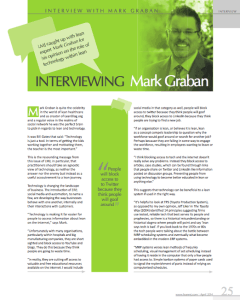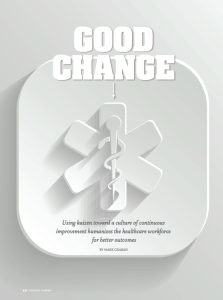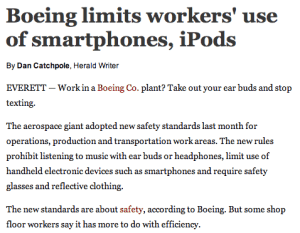Here are a few articles (and a podcast) that I either wrote and had published recently or was interviewed for.
Lean Management Journal – Lean and Technology
 I recently got introduced to the relatively new publication, the Lean Management Journal and I actually read the issue (which included Eric Ries being interviewed) from cover to cover, which is rare for me.
I recently got introduced to the relatively new publication, the Lean Management Journal and I actually read the issue (which included Eric Ries being interviewed) from cover to cover, which is rare for me.
The publication is subscription only, but they've allowed me to share the interview they did with me on Lean and technology (PDF).
From the interview:
“If an organisation is lean, or believes it is lean, lean as a concept compels leadership to question why the workforce would goof around or search for another job? Perhaps because they are failing in some way to engage the workforce, resulting in employees wanting to leave or waste time.
“I think blocking access to tech and the internet doesn't really solve any problems. Instead they block access to articles, case studies, which can be found through links that people share on Twitter and LinkedIn like information posted on discussion groups. Preventing people from using technology to become better educated in lean or anything else.”
This suggests that technology can be beneficial to a lean system if used in the right way.
Industrial Engineer Magazine – Good Change
 I had an article published as a cover story for the February 2014 issue of Industrial Engineer magazine: “Good Change: Using kaizen toward a culture of continuous improvement humanizes the healthcare workforce for better outcomes” (PDF).
I had an article published as a cover story for the February 2014 issue of Industrial Engineer magazine: “Good Change: Using kaizen toward a culture of continuous improvement humanizes the healthcare workforce for better outcomes” (PDF).
You can also read this online if you don't want the PDF.
From the article:
Many healthcare organizations talk about the importance of a culture of continuous improvement. But is this culture an aspirational goal or a reality? Your local hospital's website might include flowery statements about how it strives for excellence, encourages input from all stakeholders and continually improves in everything it does.
But do hospitals actually listen to their employees' and physicians' ideas, engaging everybody to make improvement happen? Perhaps you can test this by visiting your local hospital and asking staff members in the cafeteria or coffee shop if they work in a culture of continuous improvement. You might get a shrug or a cynical eye roll as a response.
Are you helping create a thriving culture of continuous improvement? Is your organization “walking the walk?”
Gemba Academy Podcast – Lean Healthcare
I was a guest on Ron Pereira's Gemba Academy Podcast for episode #7 (a series that replaces his recent and short-lived LSS Academy Podcast).
Ron and I talk about a number of Lean healthcare topics, including my favorite Peter Scholtes / Peter Drucker quote, what my favorite book is (it doesn't have the word “Lean” in the title!), how I moved from manufacturing into healthcare, what “respect for people” means and more.
Anyway, I hope this helps you kill time during your commute, a road trip, or a flight
:-)
A quote:
“… it's far too easy for change agents or Lean people or black belts or leaders to quickly label people as, “Well they're resistant to change.” To really marginalize or diminish people.
Wait a minute, if we're really truly being respectful and people have concerns, we have to understand those concerns. A lot of times people are being “resistant” because they don't understand why this change is happening.
Responsible leaders need to make sure people understand the problem, understand the current reality. Sometimes people “resist” because they're being told what to do. They weren't being involved in developing solutions.
When people understand why changes are necessary, when they're involved in the process, that “resistance” more often that not fades away.
Instead of blaming and labeling people we need to work with them and collaborate, that's far more effective then “Change Management” programs. Just work with people.
The KaiNexus Blog – Lean and Mobile Devices
I've written a few articles for the new KaiNexus blog recently in addition to my writing here.
 I was recently quoted in this news story from Everett, WA: “Boeing limits workers' use of smartphones, iPods.”
I was recently quoted in this news story from Everett, WA: “Boeing limits workers' use of smartphones, iPods.”
I expanded upon my thoughts about technology and mobile devices in the workplace in this blog post for KaiNexus: “Do Cell Phones Reduce Productivity or Benefit Continuous Improvement?”
I love how Greg Jacobson, MD from KaiNexus talks about shovels as a technology. A shovel can:
- Be used to dig a hole (probably value adding)
- Be leaned on by a person who is being lazy (probably not good)
- Be used to hit a person over the head (definitely not good)
The shovel is just a tool. It's neither good nor bad. It's all in how it's used.
People “goofing off” at work isn't a technology problem, it's a management/culture problem. I agree with Paul Levy's view that “blocking Facebook won't stop stupidity.”
I drew another analogy in my post:
To the productivity concerns… if we ban smart phones, people will find other ways to waste time because we haven't gotten to the root cause of why people are disengaged and unhappy at work. Look at the human voice as a technology. Talking can be productive (pointing out a problem, calling over a supervisor, or collaborating on an improvement) or talking can be a time waster (shooting the breeze and telling jokes). Talking face to face can create legal liabilities if those jokes are offensive or inappropriate! But, we don't ban talking in the workplace. Managers need to coach people on avoiding bad behaviors and correct people when they are being inappropriate.
LinkedIn – When I was 22, Advice to Myself
As part of the LinkedIn Influencers series, I was asked to think back (18 years) to what advice I would give to me 22 year old self. I wrote this article: “If I Were 22: Be Flexible in Your Career Plans.”
One line, which I really mean, that got a lot of positive feedback:
I've learned that five years is about the longest horizon that you can see. That's the furthest you can realistically plan for. Beyond five years isn't a plan; it's a dream. And your dreams are likely to change along the way. I've seen my career as a series of rolling five-year plans and I'm constantly reevaluating and tweaking.
I hope you find some or all of this to be helpful or interesting. What advice would you give to your 22 year-old self or other 22 year olds today?
Please scroll down (or click) to post a comment. Connect with me on LinkedIn.
Let’s build a culture of continuous improvement and psychological safety—together. If you're a leader aiming for lasting change (not just more projects), I help organizations:
- Engage people at all levels in sustainable improvement
- Shift from fear of mistakes to learning from them
- Apply Lean thinking in practical, people-centered ways
Interested in coaching or a keynote talk? Let’s talk.
Join me for a Lean Healthcare Accelerator Trip to Japan! Learn More











A recent Dilbert cartoon addresses the smartphone issue… the boss is driving productivity above all else?
“You have a large screen smartphone and yet you don’t work while walking from one place to another? That’s like stealing from the company.”
A discussion on the mobile phone question via Google+.
Didier Rabino wrote:
My response:
Hi Dider — I still think that people “goofing off” (whether talking or reading a newspaper or using a phone) is a management problem, not a technology problem. I don’t see people screwing around on phones at Toyota. It’s probably because of better leadership, not more draconian rules and policing of phone use.
More from Didier:
Comments are closed.